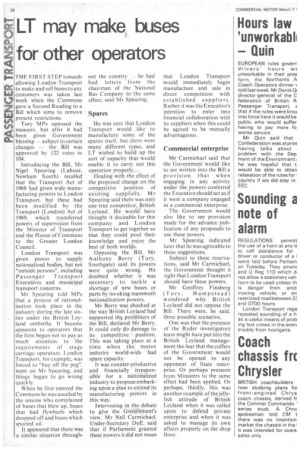LT may make buses for other operators
Page 30

If you've noticed an error in this article please click here to report it so we can fix it.
THE FIRST STEP towards allowing London Transport to make and sell buses to any customers was taken Iasi week when the Commons gave a Second Reading to a Bill which aims to remove present restrictions.
Tory MPs opposed the measure, but after it had been given Government blessing — subject to certain changes — the Bill was approved by 122 votes to 104.
Introducing the Bill, Mr Nigel Spearing (Labour, Newham .South) recalled that the Transport Act of 1968 had given wide manufacturing powers to London Transport, but these had been modified by the Transport (London) Act of 1969, which transferred powers of supervision from the Minister of Transport and the House of Commons to the Greater London Council.
London Transport was given power to supply nationalized bodies, but not "outside persons", including Passenger Transport Executives and municipal transport concerns.
Mr Spearing told MPs that a process of rationalisation took place in the industry during the late sixties under the British Leyland umbrella. It became apparent to operators that the firm began not to pay as much attention to the requirements of stage carriage operators. London Transport, for example, was forced to "buy off the peg", went on Mr Spearing, and things began to go wrong quickly.
When he first entered the Commons he was assailed by the unions who complained of buses that blew up; buses that had flywheels which dropped off and buses which spurted oil.
It appeared that there was a similar situation through out the country he had had letters from the chairman of the National Bus Company to the same effect, said Mr Spearing.
Spares
He was sure that London Transport would like to manufacture some of the spares itself, hut ,there were many different types, and LT wished to build up the sort of capacity that .would enable it to carry out this operation properiy.,c, Dealing with the effect of the proposed change on the competitive position of existing suppliers, Mr Spearing said there was only one true competitor, British Leyland. He wouldhave thought it desirable for this company and London Transport to get together so that they could pool their knowledge and enjoy the best of both worlds.
Opposing the Bill, Mr Anthony Berry (Tory, Southgate) said its powers were quite wrong. He doubted whether it was necessary to tackle a shortage of new buses or parts by invoking mammoth nationalization powers.
Mr Berry was shocked at the way British Leyland had supported thg promoters of the Bill, declared Mr Berry. It could only do damage to its competitive position. This was taking place at a time when the motor industry world-wide had spare capacity.
It was counter-productive and financially irrespon sible for a nationalized industry to propose embarking upon a plan to extend its manufacturing powers in this way.
Intervening in the debate to give the Government's view, Mr Neil Carmichael, Under-Secretary DoE, said that if Parliament granted these powers it did not mean that London Transport would immediately begin manufacture and sale in direct competition with established suppliers. Rather it was the Executives intention to enter into financial collaboration with its suppliers when this could be agreed to be mutually advantageous.
Commercial enterprise
Mr Carmichael said that the Government would like to see written into the Bill a provision that when engaging in any activity under the powers conferred the Executive should act as if it were a company engaged in a commercial enterprise.
The Government would also like to see provision made for the advance publication of any proposals to use these powers.
Mr Spearing indicated later that he was agreeable to these suggestions.
Subject to these reservations, said Mr Carmichael, the Government thought it right that I ,ond on Transport should have these powers.
Mr Geoffrey Finsberg (Tory, Hampstead) wondered why British Leyland did not oppose the Bill. There were, he said, three possible scenarios.
One was that the presence of the Ryder investigatory team might have put into the British Leyland management the fear that the coffers of the Government would not be opened to any opponent of State enterprise. Or perhaps pressure from Ministers to the same effect had been applied. Or perhaps, thirdly, this was another example of thejellyfish attitude of British Leyland when it was called upon to defend private enterprise and when it was asked to manage its own affairs properly on the shop floor.












































































































































































